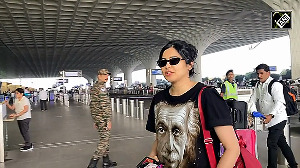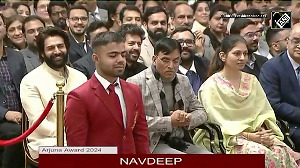The taxes on cash transactions and on fringe benefits are not intended as revenue raising measures but to find the trail to black money, in the case of the first, and to bring under tax those perquisites that companies provide but do not pay a tax on, in the case of the second.
K M Chandrashekhar, revenue secretary in the Ministry of Finance, was speaking at a meeting hosted by the Confederation of Indian Industry in New Delhi on March 2, 2005.
He insisted that a 0.1 percent tax on cash withdrawals of Rs 10,000 and more, was really an insignificant amount. "Don't tell me that we cannot pay this small amount every time we withdraw cash," he asked, adding, "It is the same as paying a commission every time you use a cheque or your credit or ATM card."
The revenue secretary was accompanied by Rakesh Mohan, secretary, economic affairs; Ashok Lahiri, chief economic advisor; and Parthasarathi Shome, advisor to the finance minister.
Not surprisingly, among the many questions and issues raised, the matter that dominated was the transaction tax and the fringe benefit tax.
In fact, so severe has been the outcry from business and public that Finance Minister Palaniappan Chidambaram (who around the same time was addressing a meeting organised by the rival Federation of Indian Chambers of Commerce and Industry barely a kilometre away) indicated that he might consider raising the limit and would also look into the fringe benefit tax to ensure that 'genuine expenditure' was not taxed.
But at the CII meet, Chandrashekhar told the gathered captains of industry that such small costs and taxes should not really raise a hue and cry. "We are introducing the bill and certainly we will look into any concerns that you may have," he promised, "but the taxes will have to stay."
He said the transaction tax was to find a way to get banks to furnish details about cash withdrawn and which often find their way into the underground economy. "The underground economy is estimated at around 20 per cent of our GDP. We have to fight this menace," he said.
Regarding the fringe benefit tax, whose details are just coming out, concerns were raised about genuine expenses such as a person travelling to another city for business meeting and the same being taxed in case the government perceived he was on vacation!
Chandrashekhar admitted that the details will have to be worked out. "Look, these measures will come in place only from July 1, so we have four months to work on the details so that problems can be sorted out," he said an invited the CII to meet him for the same.
Earlier, speaking about the Budget, he said the government was determined to simplify India's complex tax structure so that the day was not far away when individuals could calculate their own income tax and pay the same with ease.
"Today, going to pay tax and file your (income-tax) returns is viewed with some amount of fright by millions. We are keen to simplify the system so that paying taxes becomes user friendly," he said.
He said this initiative needed the participation of the private sector to help facilitate the paying of taxes and duties, whether in the cities or at ports (where customs duties are paid).
He further said that for the large tax payer (which is still to be defined) the government was working at integrating the different duties paid so that such a payer could pay all the different taxes and duties at a single window.
The measure would be of immense help to businessmen who have to pay excise duty, customs duty, income tax, and corporate tax. The aim was that all such duties and taxes should be payable at a single window rather than the present multiplicity of windows.
He added that this step would require administrative reforms and would thus take some time.
Parthasarathi Shome said the rationale behind the tax reforms was to improve the ratio of tax to GDP by improving tax payment and widening the tax base.
Chief Economic Advisor Ashok Lahiri said that whenever he read various economic articles, he found that the compared India with China.
"These articles often mention that one of our greatest strengths is our financial sector, while of course one of greatest weaknesses is our physical infrastructure. It is to play to our strength that we have decided to make Mumbai into a world-class financial centre that lies midway between London and Tokyo (both among the world's top three financial centres along with New York)," he said.
But he pointed out that growth must be matched by equitable distribution and which is why the Budget so strongly emphasised rural development, health, education, and infrastructure.






 © 2025
© 2025